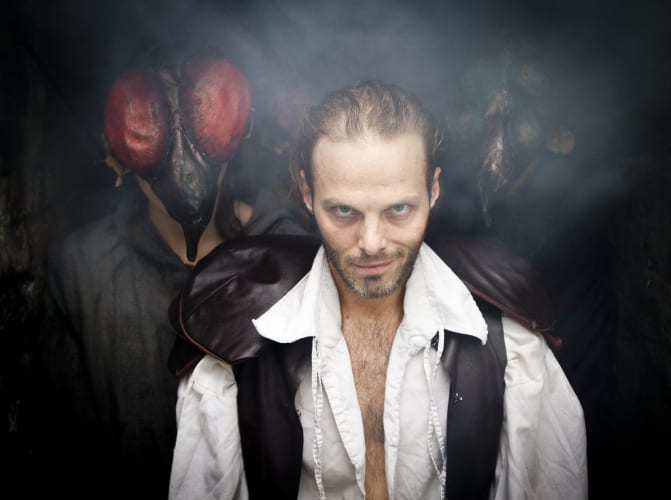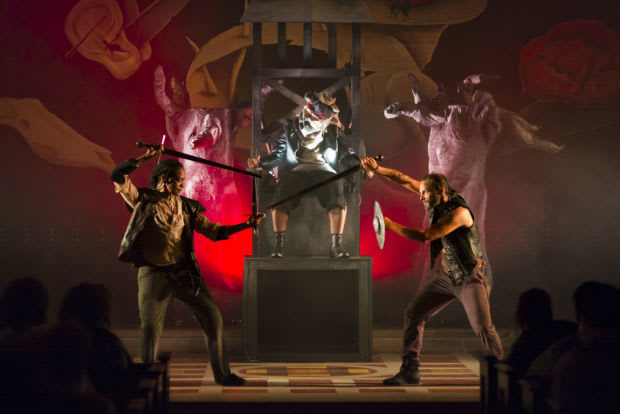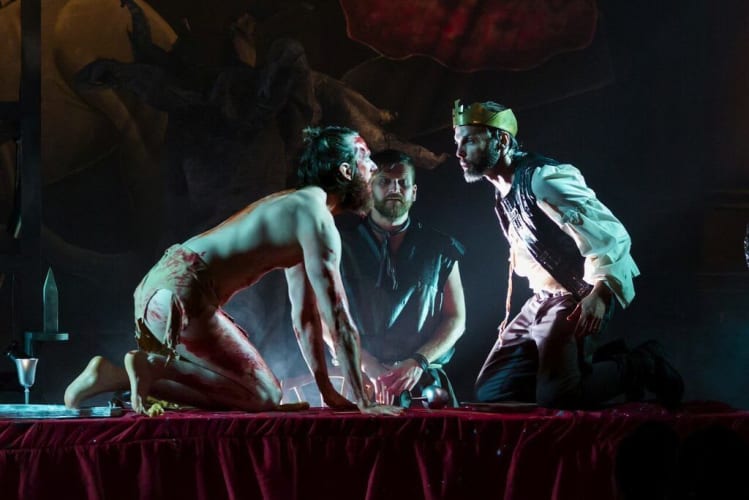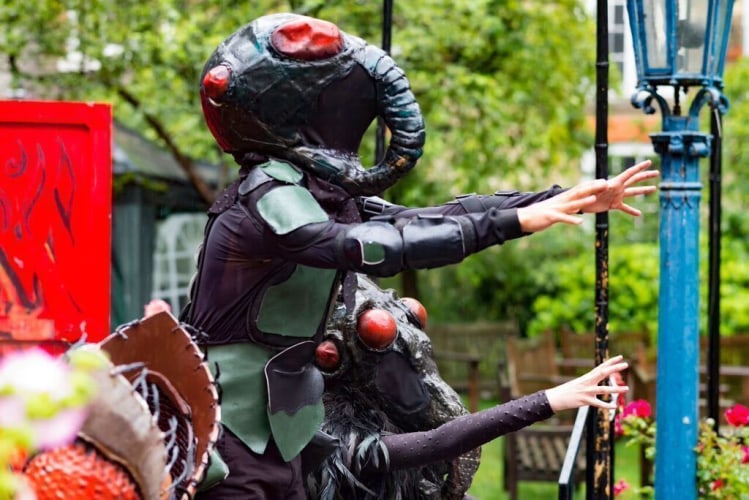The gardens of St Paul’s Church, Covent Garden, are a delightful spot to sit in the sunshine among the roses to eat lunchtime sandwiches or take a break from the life of the city. For ten years now, they have also been the home of Iris Theatre, presenting promenade productions of plays in the church and its grounds. But can something as dark as the Scottish Play be made to fit into this environment?
I can’t tell you if it works in bright sunshine. The press performance was given under more appropriate lowering grey skies, the ominous rumblings of Filipe Gomes's sound score could have been thunder and the glimpse of close-up battle that opens the production was fought on grass still muddy from its last drenching.
Director Daniel Winder and his designers have taken inspiration from the surreal paintings of Hieronymus Bosch. Trees have sprouted strange excrescences, beneath a castle parapet gates open on hellfire and the witches who prophecy Macbeth’s advancement have assumed strange forms: a huge-eyed black insect, a head that emerges from a carnivorous venus flytrap and a strange trunk-nosed creature on stilt legs. When the scene moves to England, away from their influence, there is an idyllic rose bower, but inside the church it is back to Bosch again.
From the opening battle, the witches exert their influence; it is they who rouse the dead and clear them from the field leading the audience away to the next location where King Duncan hears of Macbeth’s exploits.
There are some substantial cuts to the text and, with a cast of only seven, there is doubling for everyone, including Macbeth and his lady, and the production is gender-blind, with some amazingly rapid changes between characters.
David Hywel Baynes, who has recently set up the New York Shakespeare Company, returns to Iris theatre (for whom he was a notable Richard III and March Hare among other roles) to play Macbeth. It is a remarkable performance of a man full of euphoria at his initial victory developing increasing neurosis as his ambitious wife urges him to murder, overcoming his own sense of duty and sinking further into blood. Though sense is clear, he interrupts the flow of verse in a way that emphasises his struggle and increasing paranoia, a vocal indication of his “heat oppresséd brain”.
Mogali Masuku’s Lady Macbeth conceives the idea of killing the King almost as soon as she reads her husband’s letter telling her about the witches and hears that Duncan is to be her guest. This is a lady who is already wearing body armour over her dress. We don’t see her in warlike exercise so presumably that is symbolic of her nature. Small-voiced at first, she grows both vocally and in stature as ambition takes over. (In fact Mogali later proves herself an excellent swordswoman fighting Macbeth as Young Siward.)
Nick Howard-Brown is a Banquo who seem to have suspicions about Macbeth but says nothing from self-interest. Matt Stubbs is a formidable Macduff flourishing a broadsword (Roger Bartlett has staged some dangerous looking fights) who reacts to news of his family’s murder with angry grief.
Stephan Boyce plays King Duncan (stripped of his ancient years), Linford Johnson Ross and the comic porter (who oddly keeps some of his lines when replacing the doctor Shakespeare has attending the sleep-walking Lady Macbeth) and Jenny Horsthuis is Prince Malcolm, tall and upright, the transparent innocent in the English scene and closing the play with dignity.
The production is a promenade and needs time to move a large audience through quite narrow spaces as they change location so, despite the cuts, this shorter of Shakespeare’s plays still runs three hours. A fragmented delivery, often shouted to make it carry across outdoor spaces, slows things further. It may be intended to make ideas sound fresh-minted but rarely does so, but the company in their multiple incarnations make up in physical energy for what they lack in verse and vocal skill.
This is a production that effectively tells the story and has some interesting innovations as, for instance, when Macbeth, seeing an imaginary, does think he has managed eventually to grasp it and lets it lead him onwards. There is a piece of text I’ve never come across before in which Duncan sends Lady Macbeth a jewel. Banquo doesn’t just pop up on cue as a ghost at a royal banquet: he’s one of the first to arrive before the hosts do.
And what a strange banquet where two of the witches are in attendance in the misty shadows inside the church and the only actual guest is Macduff (or is the actor still one of Macbeth’s murderers?) and all the others are in Macbeth’s imagination. It makes you think much more may be just in his mind.



